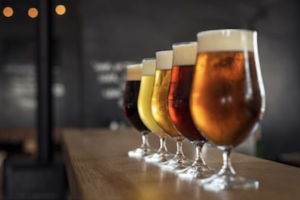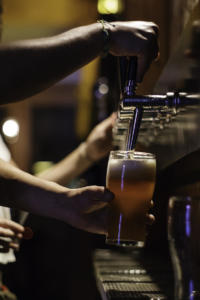 Although a shot and a beer (and hopefully a burger with fries to accompany it) is never going to go out of style, craft beer, breweries and brewpubs are on the rise. Long gone are the days where a server or bartender could simply recommend a Pilsner, a Hefeweizen or, dare we say, a Lite beer. Educating your staff so that they talk the talk is more important than ever.
Although a shot and a beer (and hopefully a burger with fries to accompany it) is never going to go out of style, craft beer, breweries and brewpubs are on the rise. Long gone are the days where a server or bartender could simply recommend a Pilsner, a Hefeweizen or, dare we say, a Lite beer. Educating your staff so that they talk the talk is more important than ever.
Guests who enjoy a good brewery or brewpub experience (btw, breweries make beer for distribution and can sell their product on-site whereas brewpubs can sell their own beer onsite but cannot distribute it) are generally extremely knowledgeable about beer. They make the rounds at all local breweries and can tell the difference between a Saison and a Kolsch; maybe even the difference between an American IPA, an English-style IPA and an American Pale Ale. These guests do not want to have to explain the differences to their server or bartender; they need the staff to do the talking. And words and phrases like “hops,” “ABV,” “hazy” and “wort” need to roll off their tongues.
This is where education and training comes into play. It’s not enough for your server to be able to describe the fried chicken sandwich’s house-made “special sauce.” They need to speak the language of BEER. It is unique, it is detailed, it is nuanced; it has a history and a story to accompany it. It is of the utmost importance that your staff is constantly being trained, educated and re-educated so they become fluent in Beer Talk. Assuming you’re innovating and creating new product at the pace required to stay relevant, this is all the more instrumental in keeping your team up-to-date and excited.
As a former restaurant server, I remember the giant handbook I’d be given prior to starting a new job. Seventy-nine pages worth of garnishes, ingredients and allergens. It’s not enough to teach new staff the nitty gritty details via a training manual before they ever get onto the floor. That’s called memorization. Training and education needs to be ongoing and reinforced. Consider weekly or twice-weekly tastings – a reminder of what’s old, and an introduction to what’s new. Allow your brewery’s brewmaster to describe the beers’ flavor in their own words. Brewpubs can bring in “local celebrity” brewmasters to inspire and excite the team.
“What made us stand out in a city rife with breweries and brew pubs,” said Terry Kane, a hospitality professional who operated brewpubs in Chicago, “was the love our staff had for what they did and the enthusiasm and knowledge they shared with our guests. That wasn’t by accident,” he continued, “We trained and educated daily and were sticklers for quality assurance, making sure everything stuck.”
hospitality professional who operated brewpubs in Chicago, “was the love our staff had for what they did and the enthusiasm and knowledge they shared with our guests. That wasn’t by accident,” he continued, “We trained and educated daily and were sticklers for quality assurance, making sure everything stuck.”
When it comes to your guests, stand out from the crowd by offering them opportunities to “Dine with the Brewmaster” (an intimate dinner hosted by the person who knows the beer best), to engage in unique beer tastings, and to purchase special pairing dinners.
However, if the investment in this education is truly going to pay off, it is paramount that you measure its efficacy. Partnering with a quality assurance provider to ensure that your staff is employing proper pours into proper glassware, can accurately describe the predominant flavors of distinct beers, and can walk without spilling is obviously important. But it’s equally important – arguably more so – to measure the more subtle and subjective standards of “server exuded enthusiasm for their beer of choice,” “bartender made me feel more educated on the subject of beer,” “bartender clearly loved talking about beer,” etc.
This is how you rise to the top of a competitive industry, much like the head of your beer (if you don’t know what that means, ask your local brewery bartender – they should know).













